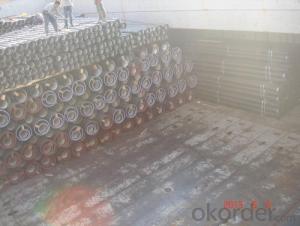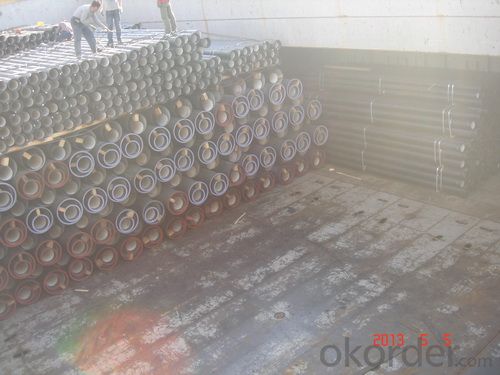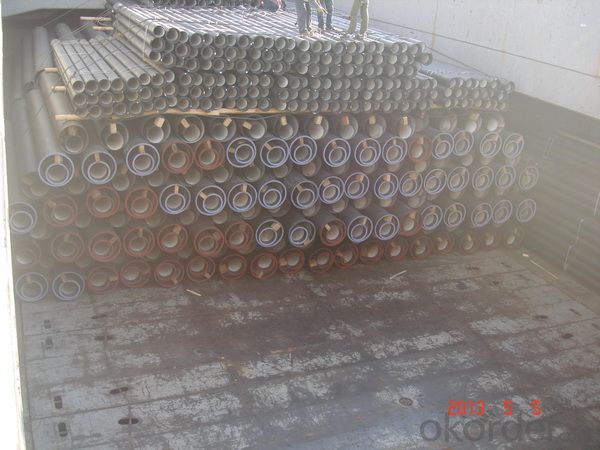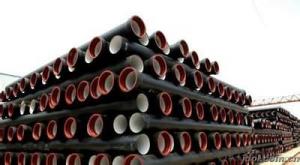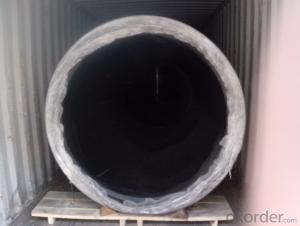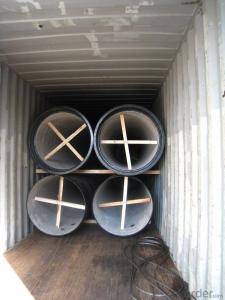DUCTILE IRON PIPE DN1200 c
- Loading Port:
- Tianjin
- Payment Terms:
- TT OR LC
- Min Order Qty:
- -
- Supply Capability:
- 30000Tons m/month
OKorder Service Pledge
OKorder Financial Service
You Might Also Like
CNBM ductile iron pipe ranges from DN80-DN1600mm (T-Type, Class K9), effective length 6m, comply with ISO2531 Standard
Company Profile
CNBM International Corporation is the leading production base and renowned supplier of Ductile Iron Water Pipe systems of both potable and waste water in China. We are constantly looking to develop high quality products to ensure the longest service life and wonderful performance.
CNBM Pipelines regard quality as the essential factor leading to successful business. Every pipe is tested in accordance with BS EN545 (water application) or BS EN598 (sewer application). CNBM Pipelines products comply with and are tested according to the relevant European and International Standards. Our pipes are manufactured under the quality management system BS EN ISO 9001. After years of efforts, CNBM Pipelines has built up great reputation in terms of quality and service among customers worldwide
Product Introduction
CNBM ductile iron pipe ranges from DN80-DN1600mm (Tyton, T-Type, Class K7/K8/K9), effective length: 6m, complying with BS EN545/EN598/ISO2531/BS4772.
Specification& Payment terms
Internal lining: Pipes shall have an internal cement mortar lining in acc with ISO4179.
External coating: Pipes shall be externally coated with metallic zinc spray plus a further layer of resin painting to ISO8179.
Gasket: 100% SBR/NBR/EPDM gasket in accordance with ISO4633.
Packing: Pipes from DN100 to DN300 be bundled with steel belts, the others are in bulk.
Payment term: By 30% T/T advance payment + 70% Irrevocable L/C at sight.
Packing: In bulk vessel or in container.
- Q: What are the different types of coatings available for ductile iron pipe?
- The different types of coatings available for ductile iron pipe include cement mortar lining, polyethylene sleeving, polyurethane coatings, and epoxy coatings. Each coating offers specific benefits such as corrosion resistance, improved flow characteristics, and protection against external elements.
- Q: Can ductile iron pipes be used in high-temperature applications?
- Yes, ductile iron pipes can be used in high-temperature applications. Ductile iron pipes have a higher melting point compared to other types of pipes such as PVC or HDPE, making them suitable for carrying fluids at elevated temperatures. The material properties of ductile iron, including its strength, toughness, and resistance to thermal stress, enable it to withstand higher temperatures without deforming or failing. However, it is important to note that the specific temperature limit for ductile iron pipes may vary depending on factors such as the grade of ductile iron used, the pressure of the fluid being carried, and the duration of exposure to high temperatures. Therefore, it is crucial to consult the manufacturer's specifications and guidelines to ensure that ductile iron pipes are appropriately selected and installed for high-temperature applications.
- Q: Do ductile iron pipes require special handling during transportation?
- Transporting ductile iron pipes requires special handling. While these pipes are known for their strength and durability, improper handling can result in damage. Due to their weight and size, it is crucial to use appropriate lifting and handling equipment. Dropping or impacting the pipes must be avoided to prevent cracks or fractures. Moreover, pipes should be stored and transported securely to prevent rolling or shifting, which could harm the pipe coating and fittings. Additionally, it is advisable to shield the pipes from extreme temperatures or adverse weather conditions during transportation. Adhering to these guidelines and taking necessary precautions will minimize the risk of damage during transportation.
- Q: What are the advantages of using ductile iron pipes?
- There are several advantages of using ductile iron pipes. Firstly, they have high tensile strength and durability, making them resistant to cracking and breaking under pressure or external forces. Secondly, ductile iron pipes have excellent corrosion resistance, allowing them to withstand harsh environments and reducing the risk of leaks and pipe failures. Additionally, they provide better flow characteristics due to their smooth internal surface, ensuring efficient transportation of fluids. Lastly, ductile iron pipes have a long lifespan and require minimal maintenance, resulting in cost savings and reliable infrastructure for water supply and wastewater management systems.
- Q: Can ductile iron pipes be used in areas with high levels of organic matter in soil?
- Ductile iron pipes are capable of being utilized in regions where soil contains significant amounts of organic matter. These pipes are renowned for their robustness and potency, rendering them appropriate for diverse soil circumstances, including those with elevated organic matter levels. They possess resistance against corrosion and can endure the chemical reactions that transpire in soils abundant in organic material. Furthermore, ductile iron pipes possess a sleek inner surface, diminishing the probability of accumulation and obstruction caused by organic matter. Nonetheless, it is crucial to contemplate the precise soil conditions and seek advice from engineers or specialists to guarantee adherence to correct installation and upkeep procedures.
- Q: How are ductile iron pipes protected against interior corrosion?
- Ductile iron pipes are protected against interior corrosion through a process called cement-mortar lining. This involves applying a thick layer of cement mortar to the interior surface of the pipes, which acts as a protective barrier against corrosion caused by the flow of water or other substances. Additionally, corrosion-resistant coatings can also be applied to the pipes to provide further protection.
- Q: What are the different methods for repairing ductile iron pipe?
- Repairing ductile iron pipes can be done using various methods, which depend on the extent and location of the damage. One popular approach involves the utilization of repair clamps or couplings. These clamps or couplings, typically constructed from stainless steel, are designed to effectively seal off and prevent further leakage from leaks or cracks in the pipe. They can be used as a temporary or permanent solution. Another option is the application of epoxy lining or patching. This method entails the use of a specialized epoxy material that forms a protective barrier on the inside of the pipe, effectively covering the damaged area. It is particularly suitable for smaller cracks or leaks and offers a durable solution. In cases where the damage is more severe, such as the presence of large cracks or fractures, it may be necessary to remove and replace the damaged section of the pipe. This process involves excavating the surrounding area, eliminating the damaged part, and installing a new section of ductile iron pipe. Alternatively, trenchless repair methods can be employed. These advanced techniques, including pipe bursting or cured-in-place pipe lining, allow for pipe repair without extensive excavation. Not only can these methods be more cost-effective, but they also cause less disruption compared to traditional repair approaches. It is important to consider the extent of the damage, the pipe's location, and the available resources and expertise when selecting a specific repair method for ductile iron pipes. Seeking guidance from a professional pipe repair service is advised to determine the most appropriate approach for a particular repair situation.
- Q: What are the typical bedding and backfill requirements for ductile iron pipes?
- The typical bedding and backfill requirements for ductile iron pipes involve using a granular material, such as sand or gravel, to provide proper support and cushioning for the pipe. The bedding material should be placed evenly around the entire circumference of the pipe, ensuring that it is in direct contact with the bottom of the pipe and extending to a certain height above it. Backfill material, on the other hand, is used to fill the remaining space around the pipe and should be placed in layers and compacted to prevent settlement. Additionally, proper compaction and compaction equipment should be used to ensure the stability and long-term performance of the ductile iron pipes.
- Q: Are ductile iron pipes suitable for use in residential plumbing?
- Yes, ductile iron pipes are suitable for use in residential plumbing. Ductile iron is a strong and durable material that is resistant to corrosion, making it ideal for plumbing systems. It has a high tensile strength, which means it can withstand high pressure and is less likely to crack or break compared to other materials. Ductile iron pipes are also known for their long lifespan, lasting up to 100 years or more, making them a reliable choice for residential plumbing systems. Additionally, ductile iron pipes have excellent flow characteristics, allowing for efficient water distribution throughout the home. Overall, the strength, durability, and corrosion resistance of ductile iron pipes make them a suitable and long-lasting option for residential plumbing.
- Q: Are ductile iron pipes suitable for use in seismic areas?
- Ductile iron pipes are indeed appropriate for usage in seismic regions. The strength and durability of ductile iron enable it to endure seismic forces and ground motions linked to earthquakes. Its exceptional flexibility and high tensile strength provide resistance against cracking or fracturing in highly challenging circumstances. Furthermore, ductile iron pipes have exhibited their trustworthiness and appropriateness in seismic zones over an extensive period. Nevertheless, to optimize their efficiency and mitigate any probable risks, it is crucial to adhere to appropriate installation methods and seismic design principles.
Send your message to us
DUCTILE IRON PIPE DN1200 c
- Loading Port:
- Tianjin
- Payment Terms:
- TT OR LC
- Min Order Qty:
- -
- Supply Capability:
- 30000Tons m/month
OKorder Service Pledge
OKorder Financial Service
Similar products
Hot products
Hot Searches
Related keywords
